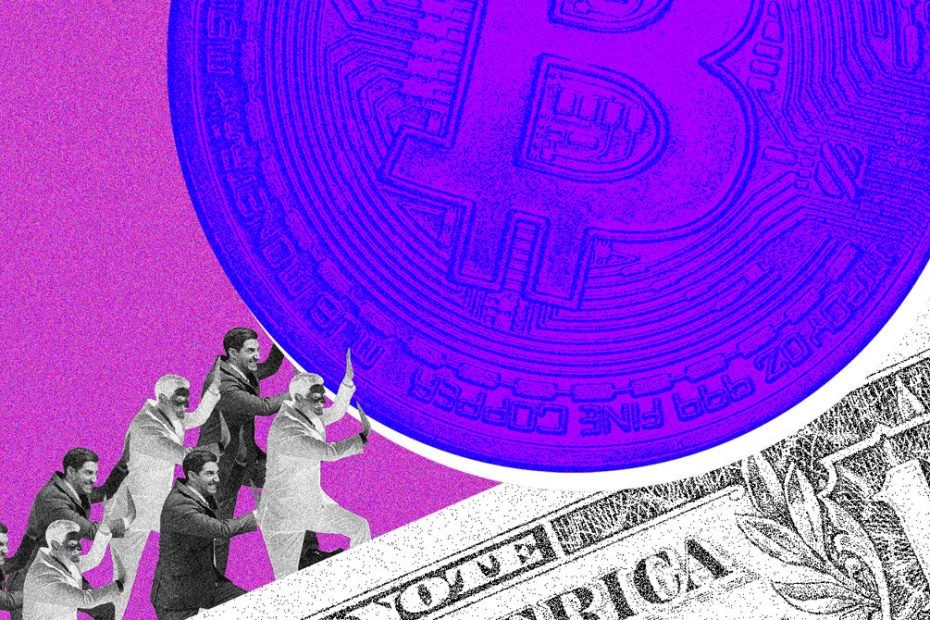Donald Trump is an unlikely crypto ally. The power of bitcoin, embodied in Satoshi Nakamoto’s founding document, is that it frees participants from murky judgments of trust, relying instead on the basis of evidence.
Bitcoin is the truth. So it was cosmically strange to hear attendees of the Bitcoin 2024 conference in Nashville last week cheering enthusiastically for a former president who, by a carefully compiled count, lied 390,573 times in his single term. Believers in a mathematically indisputable blockchain heaped hosannas when Donald Trump delivered a speech filled with lies, fabrications, and fantasies. They cheered with joy when he took credit for the meteoric rise in bitcoin’s value during his administration, knowing full well that he had, until recently, dismissed the idea of cryptocurrency.
“Bitcoin, it sounds like a scam,” he said in 2021. “I don’t like it because it’s another currency that’s competing with the dollar.” Now Trump is suddenly the darling of the crypto world, even though no one believes he has any idea how tokens work, or even what they are. “Staple coins … stablecoins,” Trump said at one point, correcting himself while presumably looking at the teleprompter, then pausing. “Do you know what a stablecoin is? Does anyone know?”
Trump clearly doesn’t. That didn’t stop him from making promises that only someone who fundamentally misunderstood bitcoin both technically and philosophically would make. He compared bitcoin to the steel industry of a century ago, a startling mismatch between an icon of the industrial revolution and a groundbreaking movement in the digital world. He then promised to make the United States “the crypto capital of the planet and the bitcoin superpower of the world.”
This sentiment, as conference attendees must have known, flips the basic premise of cryptocurrency and blockchain on its head: a sovereign system that operates without regard to the interests of any nation. To quote cryptocurrency theorist Erik Cason, “Bitcoin offers a radical new hope from which humanity can free itself from the cage that is every nation-state today.” Trump’s promise that the United States would dominate bitcoin is a slap in the face of Satoshi.
Among Trump’s proposals is a bitcoin reserve where the U.S. would hide and HODL billions of dollars’ worth of tokens, a plan experts say is of dubious value to taxpayers but could inflate the currency’s value to the enrichment of the Nashville crowd. Again, manipulation by a government superpower is anathema to the values of the blockchain revolution. Another promise Trump made was to pardon Silk Road owner Ross Ulbricht, who is currently serving a life sentence in federal prison for running a massive crypto-fueled illegal drug and money laundering operation. So much for being tough on crime.
Despite the oddity, the alliance between Trump and the bitcoin bros seems almost preordained. The crypto world chafes under government regulation and sees in Donald Trump an opportunity to ease the government’s touch, perhaps to the level of a gentle tickle. Trump has encouraged that thinking by meeting with key financiers and investors and adopting their positions. As if ratifying a thinly veiled deal, crypto players are pumping hundreds of millions of dollars into Trump’s campaign coffers. So it’s no surprise that Trump vowed at the Nashville conference to put an end to “left-wing fascists and totalitarians who are out to crush crypto.” He was cheered wildly for that sentiment. Trump also identified Kamala Harris as one of those “fascists.” “She’s anti-crypto, by the way,” he said. “She’s very anti-crypto.” (Harris has not yet determined her policy and has reached out to crypto companies.) The cheers were loudest when Trump announced he would fire Gary Gensler, the chairman of the Securities and Exchange Commission (which oversees questionable crypto fraud), on his first day back in office.
Legitimate question: “Does the current White House hate crypto,” as the industry and Trump seem to believe? I did some digging and learned that in the early days of the administration, crypto policy, certainly a relatively low priority during a pandemic, was indeed up for grabs, with some officials viewing it as a scam technology. Ultimately, though, the administration charted a course that attempted to walk a line between encouraging innovation in the space and enforcing current securities laws.

